Business Law: Analysis of Risk Passage in International Sales
VerifiedAdded on 2022/10/11
|9
|2885
|16
Essay
AI Summary
This essay provides a comprehensive analysis of the passage of risk in international contracts of sale. It examines the concept of risk, its implications for buyers and sellers, and the legal frameworks governing risk transfer. The essay delves into the provisions of the Convention on Contracts for the International Sale of Goods (CISG), specifically Articles 66-70, and how they define the obligations of the buyer and seller regarding risk. It also explores the role of Incoterms 2010, as agreed upon by the parties, in allocating risk and responsibilities. Furthermore, the essay contrasts these international standards with the principles of English common law, highlighting the differences and similarities in their approaches to risk passage. The discussion includes a detailed examination of the conditions under which risk transfers from the seller to the buyer, the impact of carriage of goods, and the remedies available to each party in cases of loss or damage. The essay aims to provide a clear understanding of the key aspects that traders should consider when determining how they want to regulate the passage of risk in their international transactions.
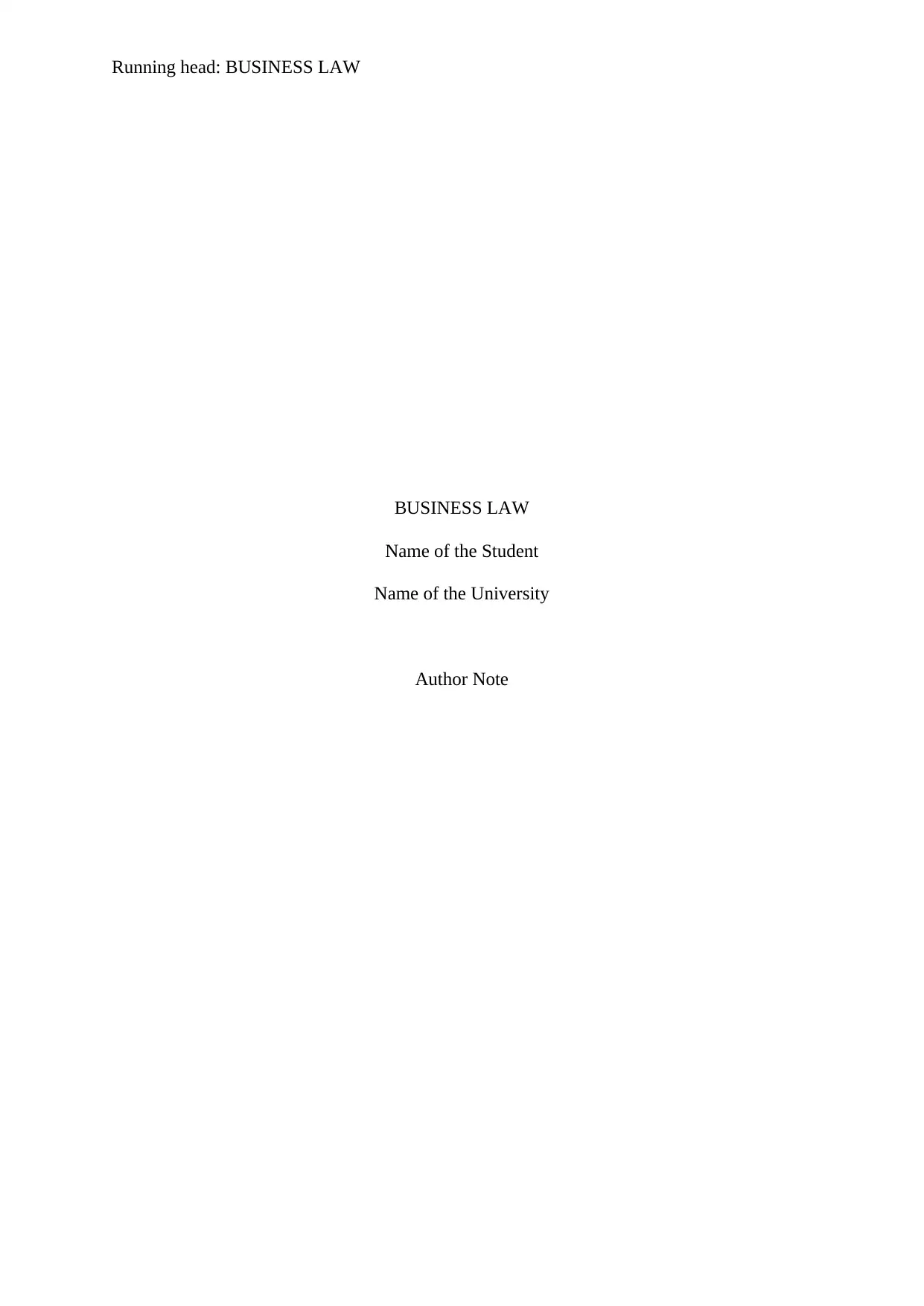
Running head: BUSINESS LAW
BUSINESS LAW
Name of the Student
Name of the University
Author Note
BUSINESS LAW
Name of the Student
Name of the University
Author Note
Paraphrase This Document
Need a fresh take? Get an instant paraphrase of this document with our AI Paraphraser
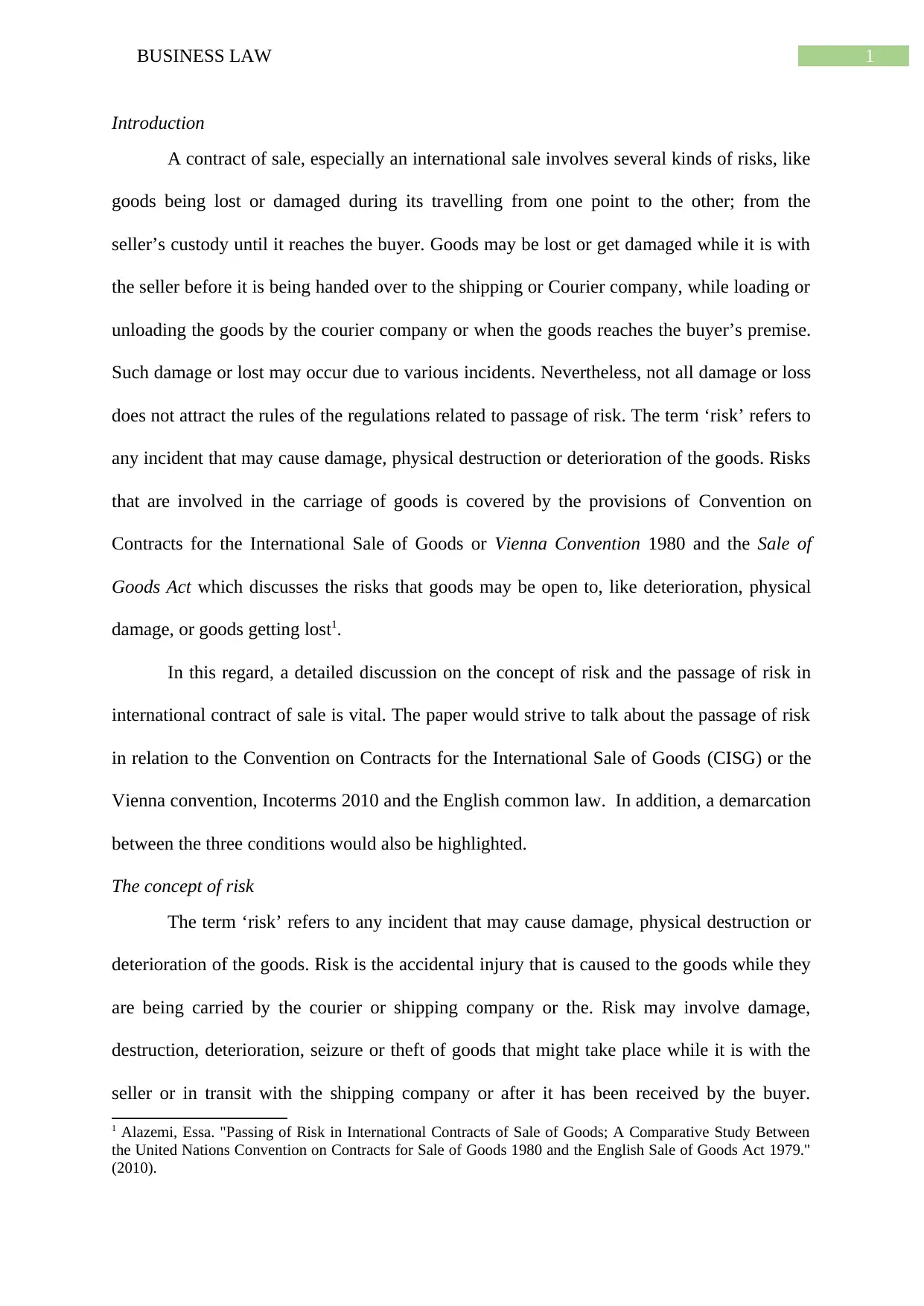
1BUSINESS LAW
Introduction
A contract of sale, especially an international sale involves several kinds of risks, like
goods being lost or damaged during its travelling from one point to the other; from the
seller’s custody until it reaches the buyer. Goods may be lost or get damaged while it is with
the seller before it is being handed over to the shipping or Courier company, while loading or
unloading the goods by the courier company or when the goods reaches the buyer’s premise.
Such damage or lost may occur due to various incidents. Nevertheless, not all damage or loss
does not attract the rules of the regulations related to passage of risk. The term ‘risk’ refers to
any incident that may cause damage, physical destruction or deterioration of the goods. Risks
that are involved in the carriage of goods is covered by the provisions of Convention on
Contracts for the International Sale of Goods or Vienna Convention 1980 and the Sale of
Goods Act which discusses the risks that goods may be open to, like deterioration, physical
damage, or goods getting lost1.
In this regard, a detailed discussion on the concept of risk and the passage of risk in
international contract of sale is vital. The paper would strive to talk about the passage of risk
in relation to the Convention on Contracts for the International Sale of Goods (CISG) or the
Vienna convention, Incoterms 2010 and the English common law. In addition, a demarcation
between the three conditions would also be highlighted.
The concept of risk
The term ‘risk’ refers to any incident that may cause damage, physical destruction or
deterioration of the goods. Risk is the accidental injury that is caused to the goods while they
are being carried by the courier or shipping company or the. Risk may involve damage,
destruction, deterioration, seizure or theft of goods that might take place while it is with the
seller or in transit with the shipping company or after it has been received by the buyer.
1 Alazemi, Essa. "Passing of Risk in International Contracts of Sale of Goods; A Comparative Study Between
the United Nations Convention on Contracts for Sale of Goods 1980 and the English Sale of Goods Act 1979."
(2010).
Introduction
A contract of sale, especially an international sale involves several kinds of risks, like
goods being lost or damaged during its travelling from one point to the other; from the
seller’s custody until it reaches the buyer. Goods may be lost or get damaged while it is with
the seller before it is being handed over to the shipping or Courier company, while loading or
unloading the goods by the courier company or when the goods reaches the buyer’s premise.
Such damage or lost may occur due to various incidents. Nevertheless, not all damage or loss
does not attract the rules of the regulations related to passage of risk. The term ‘risk’ refers to
any incident that may cause damage, physical destruction or deterioration of the goods. Risks
that are involved in the carriage of goods is covered by the provisions of Convention on
Contracts for the International Sale of Goods or Vienna Convention 1980 and the Sale of
Goods Act which discusses the risks that goods may be open to, like deterioration, physical
damage, or goods getting lost1.
In this regard, a detailed discussion on the concept of risk and the passage of risk in
international contract of sale is vital. The paper would strive to talk about the passage of risk
in relation to the Convention on Contracts for the International Sale of Goods (CISG) or the
Vienna convention, Incoterms 2010 and the English common law. In addition, a demarcation
between the three conditions would also be highlighted.
The concept of risk
The term ‘risk’ refers to any incident that may cause damage, physical destruction or
deterioration of the goods. Risk is the accidental injury that is caused to the goods while they
are being carried by the courier or shipping company or the. Risk may involve damage,
destruction, deterioration, seizure or theft of goods that might take place while it is with the
seller or in transit with the shipping company or after it has been received by the buyer.
1 Alazemi, Essa. "Passing of Risk in International Contracts of Sale of Goods; A Comparative Study Between
the United Nations Convention on Contracts for Sale of Goods 1980 and the English Sale of Goods Act 1979."
(2010).
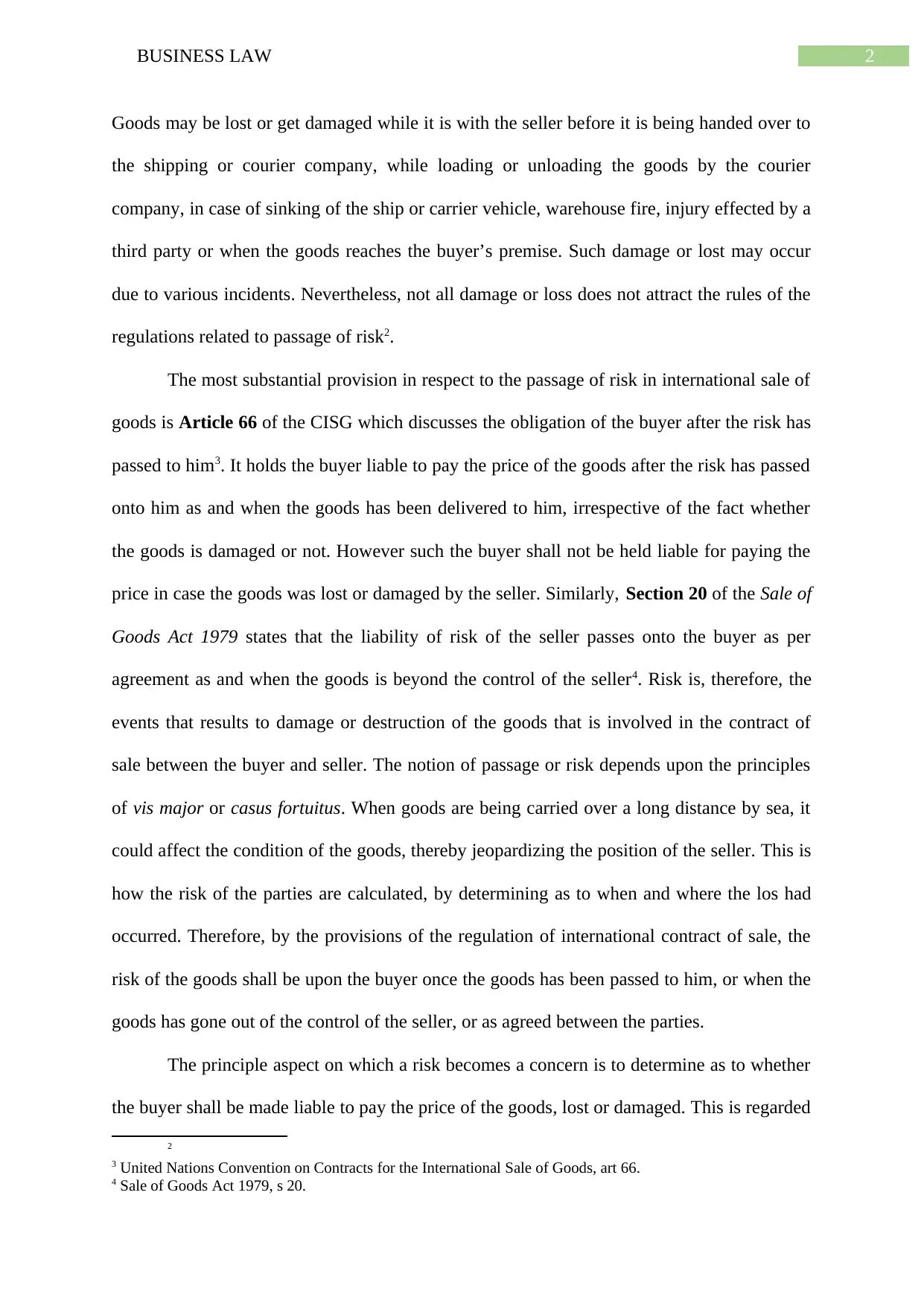
2BUSINESS LAW
Goods may be lost or get damaged while it is with the seller before it is being handed over to
the shipping or courier company, while loading or unloading the goods by the courier
company, in case of sinking of the ship or carrier vehicle, warehouse fire, injury effected by a
third party or when the goods reaches the buyer’s premise. Such damage or lost may occur
due to various incidents. Nevertheless, not all damage or loss does not attract the rules of the
regulations related to passage of risk2.
The most substantial provision in respect to the passage of risk in international sale of
goods is Article 66 of the CISG which discusses the obligation of the buyer after the risk has
passed to him3. It holds the buyer liable to pay the price of the goods after the risk has passed
onto him as and when the goods has been delivered to him, irrespective of the fact whether
the goods is damaged or not. However such the buyer shall not be held liable for paying the
price in case the goods was lost or damaged by the seller. Similarly, Section 20 of the Sale of
Goods Act 1979 states that the liability of risk of the seller passes onto the buyer as per
agreement as and when the goods is beyond the control of the seller4. Risk is, therefore, the
events that results to damage or destruction of the goods that is involved in the contract of
sale between the buyer and seller. The notion of passage or risk depends upon the principles
of vis major or casus fortuitus. When goods are being carried over a long distance by sea, it
could affect the condition of the goods, thereby jeopardizing the position of the seller. This is
how the risk of the parties are calculated, by determining as to when and where the los had
occurred. Therefore, by the provisions of the regulation of international contract of sale, the
risk of the goods shall be upon the buyer once the goods has been passed to him, or when the
goods has gone out of the control of the seller, or as agreed between the parties.
The principle aspect on which a risk becomes a concern is to determine as to whether
the buyer shall be made liable to pay the price of the goods, lost or damaged. This is regarded
2
3 United Nations Convention on Contracts for the International Sale of Goods, art 66.
4 Sale of Goods Act 1979, s 20.
Goods may be lost or get damaged while it is with the seller before it is being handed over to
the shipping or courier company, while loading or unloading the goods by the courier
company, in case of sinking of the ship or carrier vehicle, warehouse fire, injury effected by a
third party or when the goods reaches the buyer’s premise. Such damage or lost may occur
due to various incidents. Nevertheless, not all damage or loss does not attract the rules of the
regulations related to passage of risk2.
The most substantial provision in respect to the passage of risk in international sale of
goods is Article 66 of the CISG which discusses the obligation of the buyer after the risk has
passed to him3. It holds the buyer liable to pay the price of the goods after the risk has passed
onto him as and when the goods has been delivered to him, irrespective of the fact whether
the goods is damaged or not. However such the buyer shall not be held liable for paying the
price in case the goods was lost or damaged by the seller. Similarly, Section 20 of the Sale of
Goods Act 1979 states that the liability of risk of the seller passes onto the buyer as per
agreement as and when the goods is beyond the control of the seller4. Risk is, therefore, the
events that results to damage or destruction of the goods that is involved in the contract of
sale between the buyer and seller. The notion of passage or risk depends upon the principles
of vis major or casus fortuitus. When goods are being carried over a long distance by sea, it
could affect the condition of the goods, thereby jeopardizing the position of the seller. This is
how the risk of the parties are calculated, by determining as to when and where the los had
occurred. Therefore, by the provisions of the regulation of international contract of sale, the
risk of the goods shall be upon the buyer once the goods has been passed to him, or when the
goods has gone out of the control of the seller, or as agreed between the parties.
The principle aspect on which a risk becomes a concern is to determine as to whether
the buyer shall be made liable to pay the price of the goods, lost or damaged. This is regarded
2
3 United Nations Convention on Contracts for the International Sale of Goods, art 66.
4 Sale of Goods Act 1979, s 20.
⊘ This is a preview!⊘
Do you want full access?
Subscribe today to unlock all pages.

Trusted by 1+ million students worldwide
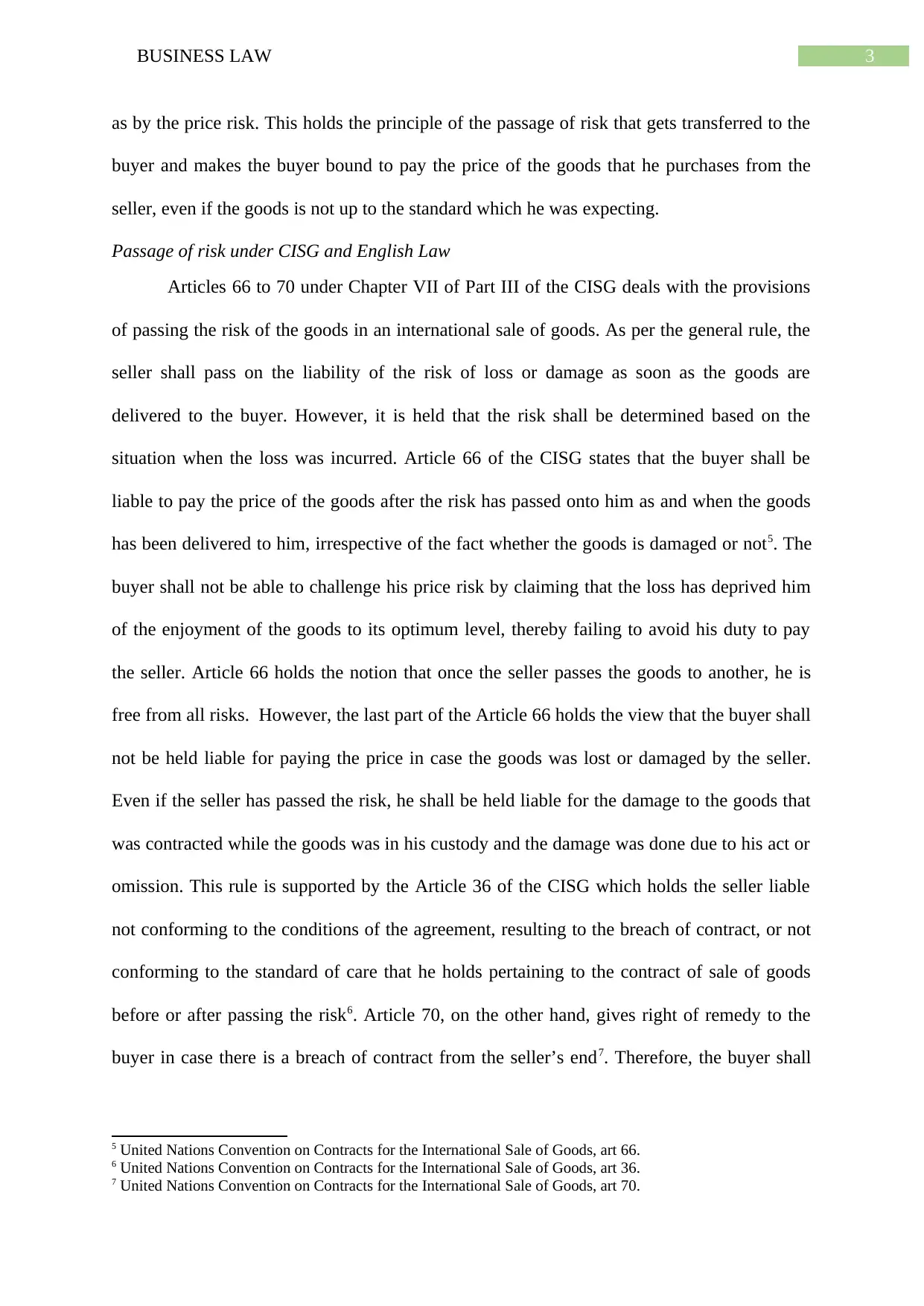
3BUSINESS LAW
as by the price risk. This holds the principle of the passage of risk that gets transferred to the
buyer and makes the buyer bound to pay the price of the goods that he purchases from the
seller, even if the goods is not up to the standard which he was expecting.
Passage of risk under CISG and English Law
Articles 66 to 70 under Chapter VII of Part III of the CISG deals with the provisions
of passing the risk of the goods in an international sale of goods. As per the general rule, the
seller shall pass on the liability of the risk of loss or damage as soon as the goods are
delivered to the buyer. However, it is held that the risk shall be determined based on the
situation when the loss was incurred. Article 66 of the CISG states that the buyer shall be
liable to pay the price of the goods after the risk has passed onto him as and when the goods
has been delivered to him, irrespective of the fact whether the goods is damaged or not5. The
buyer shall not be able to challenge his price risk by claiming that the loss has deprived him
of the enjoyment of the goods to its optimum level, thereby failing to avoid his duty to pay
the seller. Article 66 holds the notion that once the seller passes the goods to another, he is
free from all risks. However, the last part of the Article 66 holds the view that the buyer shall
not be held liable for paying the price in case the goods was lost or damaged by the seller.
Even if the seller has passed the risk, he shall be held liable for the damage to the goods that
was contracted while the goods was in his custody and the damage was done due to his act or
omission. This rule is supported by the Article 36 of the CISG which holds the seller liable
not conforming to the conditions of the agreement, resulting to the breach of contract, or not
conforming to the standard of care that he holds pertaining to the contract of sale of goods
before or after passing the risk6. Article 70, on the other hand, gives right of remedy to the
buyer in case there is a breach of contract from the seller’s end7. Therefore, the buyer shall
5 United Nations Convention on Contracts for the International Sale of Goods, art 66.
6 United Nations Convention on Contracts for the International Sale of Goods, art 36.
7 United Nations Convention on Contracts for the International Sale of Goods, art 70.
as by the price risk. This holds the principle of the passage of risk that gets transferred to the
buyer and makes the buyer bound to pay the price of the goods that he purchases from the
seller, even if the goods is not up to the standard which he was expecting.
Passage of risk under CISG and English Law
Articles 66 to 70 under Chapter VII of Part III of the CISG deals with the provisions
of passing the risk of the goods in an international sale of goods. As per the general rule, the
seller shall pass on the liability of the risk of loss or damage as soon as the goods are
delivered to the buyer. However, it is held that the risk shall be determined based on the
situation when the loss was incurred. Article 66 of the CISG states that the buyer shall be
liable to pay the price of the goods after the risk has passed onto him as and when the goods
has been delivered to him, irrespective of the fact whether the goods is damaged or not5. The
buyer shall not be able to challenge his price risk by claiming that the loss has deprived him
of the enjoyment of the goods to its optimum level, thereby failing to avoid his duty to pay
the seller. Article 66 holds the notion that once the seller passes the goods to another, he is
free from all risks. However, the last part of the Article 66 holds the view that the buyer shall
not be held liable for paying the price in case the goods was lost or damaged by the seller.
Even if the seller has passed the risk, he shall be held liable for the damage to the goods that
was contracted while the goods was in his custody and the damage was done due to his act or
omission. This rule is supported by the Article 36 of the CISG which holds the seller liable
not conforming to the conditions of the agreement, resulting to the breach of contract, or not
conforming to the standard of care that he holds pertaining to the contract of sale of goods
before or after passing the risk6. Article 70, on the other hand, gives right of remedy to the
buyer in case there is a breach of contract from the seller’s end7. Therefore, the buyer shall
5 United Nations Convention on Contracts for the International Sale of Goods, art 66.
6 United Nations Convention on Contracts for the International Sale of Goods, art 36.
7 United Nations Convention on Contracts for the International Sale of Goods, art 70.
Paraphrase This Document
Need a fresh take? Get an instant paraphrase of this document with our AI Paraphraser
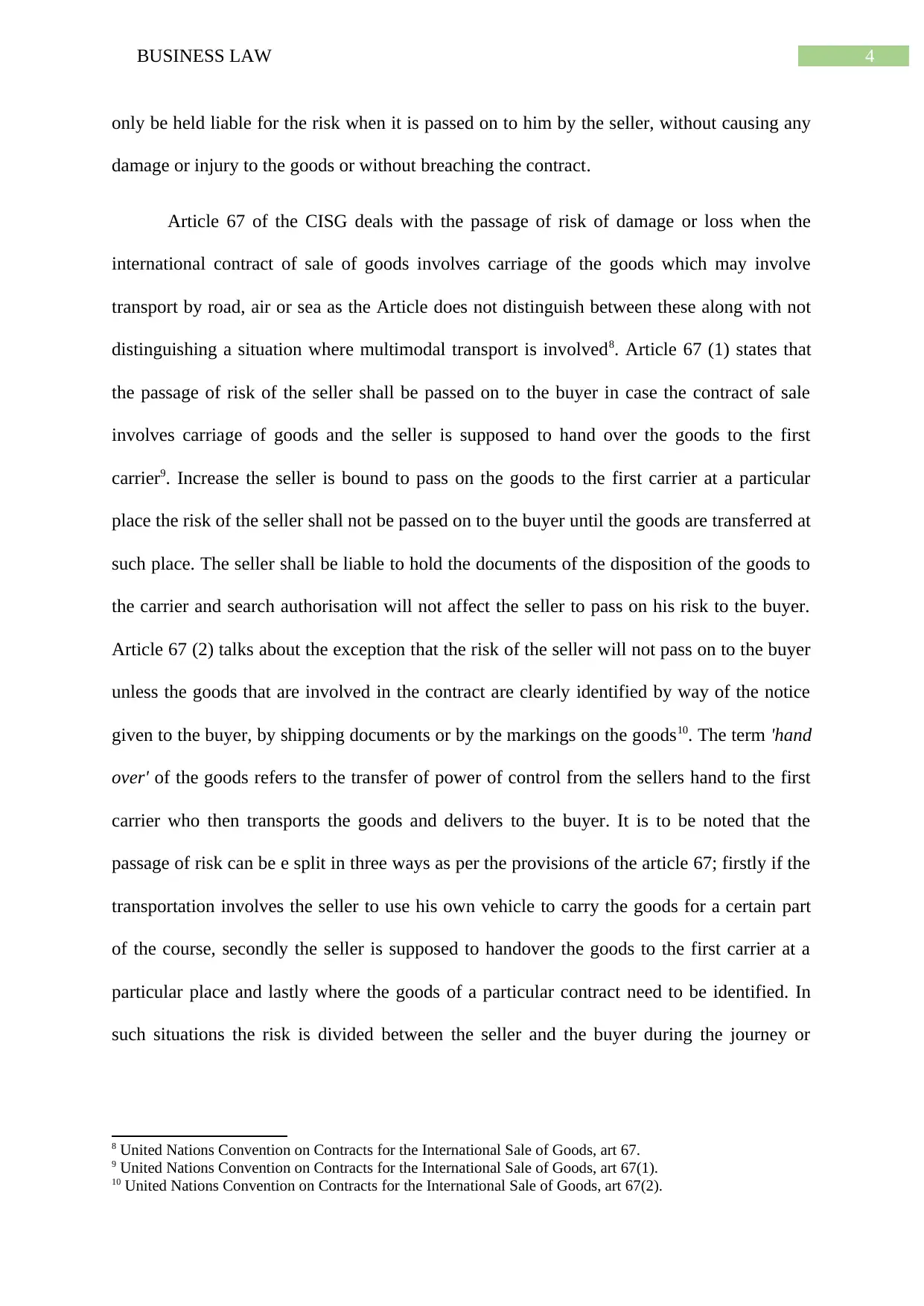
4BUSINESS LAW
only be held liable for the risk when it is passed on to him by the seller, without causing any
damage or injury to the goods or without breaching the contract.
Article 67 of the CISG deals with the passage of risk of damage or loss when the
international contract of sale of goods involves carriage of the goods which may involve
transport by road, air or sea as the Article does not distinguish between these along with not
distinguishing a situation where multimodal transport is involved8. Article 67 (1) states that
the passage of risk of the seller shall be passed on to the buyer in case the contract of sale
involves carriage of goods and the seller is supposed to hand over the goods to the first
carrier9. Increase the seller is bound to pass on the goods to the first carrier at a particular
place the risk of the seller shall not be passed on to the buyer until the goods are transferred at
such place. The seller shall be liable to hold the documents of the disposition of the goods to
the carrier and search authorisation will not affect the seller to pass on his risk to the buyer.
Article 67 (2) talks about the exception that the risk of the seller will not pass on to the buyer
unless the goods that are involved in the contract are clearly identified by way of the notice
given to the buyer, by shipping documents or by the markings on the goods10. The term 'hand
over' of the goods refers to the transfer of power of control from the sellers hand to the first
carrier who then transports the goods and delivers to the buyer. It is to be noted that the
passage of risk can be e split in three ways as per the provisions of the article 67; firstly if the
transportation involves the seller to use his own vehicle to carry the goods for a certain part
of the course, secondly the seller is supposed to handover the goods to the first carrier at a
particular place and lastly where the goods of a particular contract need to be identified. In
such situations the risk is divided between the seller and the buyer during the journey or
8 United Nations Convention on Contracts for the International Sale of Goods, art 67.
9 United Nations Convention on Contracts for the International Sale of Goods, art 67(1).
10 United Nations Convention on Contracts for the International Sale of Goods, art 67(2).
only be held liable for the risk when it is passed on to him by the seller, without causing any
damage or injury to the goods or without breaching the contract.
Article 67 of the CISG deals with the passage of risk of damage or loss when the
international contract of sale of goods involves carriage of the goods which may involve
transport by road, air or sea as the Article does not distinguish between these along with not
distinguishing a situation where multimodal transport is involved8. Article 67 (1) states that
the passage of risk of the seller shall be passed on to the buyer in case the contract of sale
involves carriage of goods and the seller is supposed to hand over the goods to the first
carrier9. Increase the seller is bound to pass on the goods to the first carrier at a particular
place the risk of the seller shall not be passed on to the buyer until the goods are transferred at
such place. The seller shall be liable to hold the documents of the disposition of the goods to
the carrier and search authorisation will not affect the seller to pass on his risk to the buyer.
Article 67 (2) talks about the exception that the risk of the seller will not pass on to the buyer
unless the goods that are involved in the contract are clearly identified by way of the notice
given to the buyer, by shipping documents or by the markings on the goods10. The term 'hand
over' of the goods refers to the transfer of power of control from the sellers hand to the first
carrier who then transports the goods and delivers to the buyer. It is to be noted that the
passage of risk can be e split in three ways as per the provisions of the article 67; firstly if the
transportation involves the seller to use his own vehicle to carry the goods for a certain part
of the course, secondly the seller is supposed to handover the goods to the first carrier at a
particular place and lastly where the goods of a particular contract need to be identified. In
such situations the risk is divided between the seller and the buyer during the journey or
8 United Nations Convention on Contracts for the International Sale of Goods, art 67.
9 United Nations Convention on Contracts for the International Sale of Goods, art 67(1).
10 United Nations Convention on Contracts for the International Sale of Goods, art 67(2).
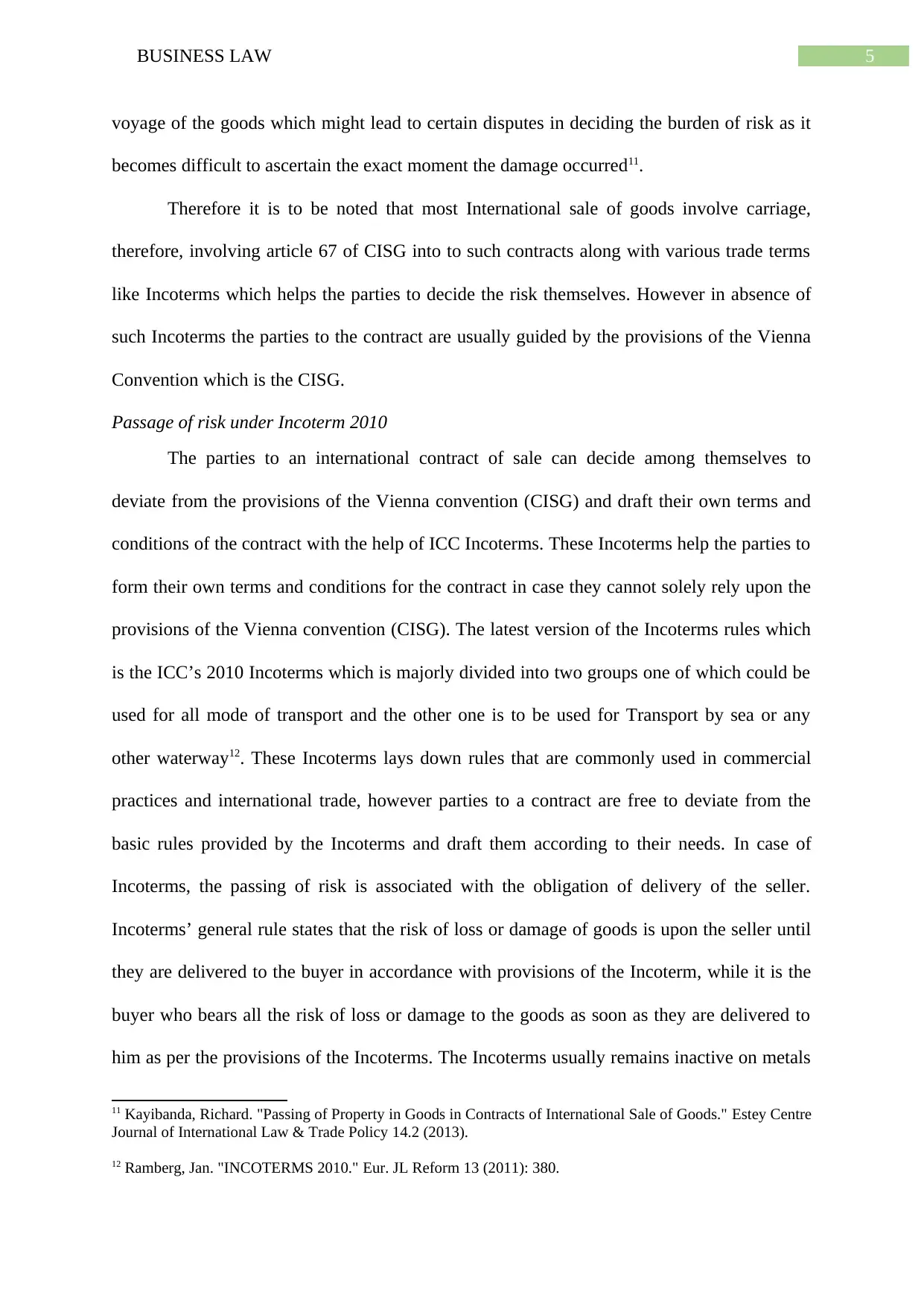
5BUSINESS LAW
voyage of the goods which might lead to certain disputes in deciding the burden of risk as it
becomes difficult to ascertain the exact moment the damage occurred11.
Therefore it is to be noted that most International sale of goods involve carriage,
therefore, involving article 67 of CISG into to such contracts along with various trade terms
like Incoterms which helps the parties to decide the risk themselves. However in absence of
such Incoterms the parties to the contract are usually guided by the provisions of the Vienna
Convention which is the CISG.
Passage of risk under Incoterm 2010
The parties to an international contract of sale can decide among themselves to
deviate from the provisions of the Vienna convention (CISG) and draft their own terms and
conditions of the contract with the help of ICC Incoterms. These Incoterms help the parties to
form their own terms and conditions for the contract in case they cannot solely rely upon the
provisions of the Vienna convention (CISG). The latest version of the Incoterms rules which
is the ICC’s 2010 Incoterms which is majorly divided into two groups one of which could be
used for all mode of transport and the other one is to be used for Transport by sea or any
other waterway12. These Incoterms lays down rules that are commonly used in commercial
practices and international trade, however parties to a contract are free to deviate from the
basic rules provided by the Incoterms and draft them according to their needs. In case of
Incoterms, the passing of risk is associated with the obligation of delivery of the seller.
Incoterms’ general rule states that the risk of loss or damage of goods is upon the seller until
they are delivered to the buyer in accordance with provisions of the Incoterm, while it is the
buyer who bears all the risk of loss or damage to the goods as soon as they are delivered to
him as per the provisions of the Incoterms. The Incoterms usually remains inactive on metals
11 Kayibanda, Richard. "Passing of Property in Goods in Contracts of International Sale of Goods." Estey Centre
Journal of International Law & Trade Policy 14.2 (2013).
12 Ramberg, Jan. "INCOTERMS 2010." Eur. JL Reform 13 (2011): 380.
voyage of the goods which might lead to certain disputes in deciding the burden of risk as it
becomes difficult to ascertain the exact moment the damage occurred11.
Therefore it is to be noted that most International sale of goods involve carriage,
therefore, involving article 67 of CISG into to such contracts along with various trade terms
like Incoterms which helps the parties to decide the risk themselves. However in absence of
such Incoterms the parties to the contract are usually guided by the provisions of the Vienna
Convention which is the CISG.
Passage of risk under Incoterm 2010
The parties to an international contract of sale can decide among themselves to
deviate from the provisions of the Vienna convention (CISG) and draft their own terms and
conditions of the contract with the help of ICC Incoterms. These Incoterms help the parties to
form their own terms and conditions for the contract in case they cannot solely rely upon the
provisions of the Vienna convention (CISG). The latest version of the Incoterms rules which
is the ICC’s 2010 Incoterms which is majorly divided into two groups one of which could be
used for all mode of transport and the other one is to be used for Transport by sea or any
other waterway12. These Incoterms lays down rules that are commonly used in commercial
practices and international trade, however parties to a contract are free to deviate from the
basic rules provided by the Incoterms and draft them according to their needs. In case of
Incoterms, the passing of risk is associated with the obligation of delivery of the seller.
Incoterms’ general rule states that the risk of loss or damage of goods is upon the seller until
they are delivered to the buyer in accordance with provisions of the Incoterm, while it is the
buyer who bears all the risk of loss or damage to the goods as soon as they are delivered to
him as per the provisions of the Incoterms. The Incoterms usually remains inactive on metals
11 Kayibanda, Richard. "Passing of Property in Goods in Contracts of International Sale of Goods." Estey Centre
Journal of International Law & Trade Policy 14.2 (2013).
12 Ramberg, Jan. "INCOTERMS 2010." Eur. JL Reform 13 (2011): 380.
⊘ This is a preview!⊘
Do you want full access?
Subscribe today to unlock all pages.

Trusted by 1+ million students worldwide
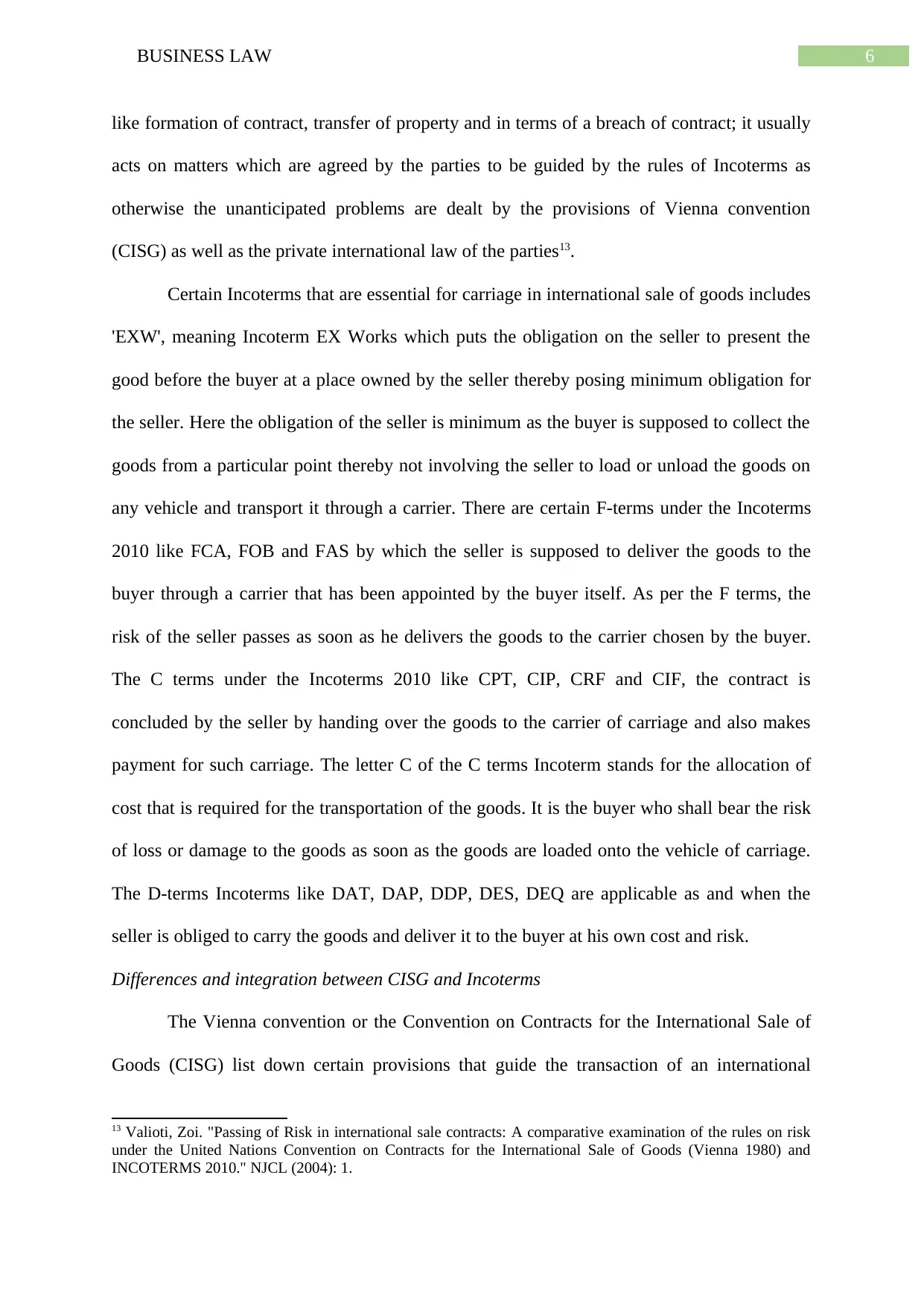
6BUSINESS LAW
like formation of contract, transfer of property and in terms of a breach of contract; it usually
acts on matters which are agreed by the parties to be guided by the rules of Incoterms as
otherwise the unanticipated problems are dealt by the provisions of Vienna convention
(CISG) as well as the private international law of the parties13.
Certain Incoterms that are essential for carriage in international sale of goods includes
'EXW', meaning Incoterm EX Works which puts the obligation on the seller to present the
good before the buyer at a place owned by the seller thereby posing minimum obligation for
the seller. Here the obligation of the seller is minimum as the buyer is supposed to collect the
goods from a particular point thereby not involving the seller to load or unload the goods on
any vehicle and transport it through a carrier. There are certain F-terms under the Incoterms
2010 like FCA, FOB and FAS by which the seller is supposed to deliver the goods to the
buyer through a carrier that has been appointed by the buyer itself. As per the F terms, the
risk of the seller passes as soon as he delivers the goods to the carrier chosen by the buyer.
The C terms under the Incoterms 2010 like CPT, CIP, CRF and CIF, the contract is
concluded by the seller by handing over the goods to the carrier of carriage and also makes
payment for such carriage. The letter C of the C terms Incoterm stands for the allocation of
cost that is required for the transportation of the goods. It is the buyer who shall bear the risk
of loss or damage to the goods as soon as the goods are loaded onto the vehicle of carriage.
The D-terms Incoterms like DAT, DAP, DDP, DES, DEQ are applicable as and when the
seller is obliged to carry the goods and deliver it to the buyer at his own cost and risk.
Differences and integration between CISG and Incoterms
The Vienna convention or the Convention on Contracts for the International Sale of
Goods (CISG) list down certain provisions that guide the transaction of an international
13 Valioti, Zoi. "Passing of Risk in international sale contracts: A comparative examination of the rules on risk
under the United Nations Convention on Contracts for the International Sale of Goods (Vienna 1980) and
INCOTERMS 2010." NJCL (2004): 1.
like formation of contract, transfer of property and in terms of a breach of contract; it usually
acts on matters which are agreed by the parties to be guided by the rules of Incoterms as
otherwise the unanticipated problems are dealt by the provisions of Vienna convention
(CISG) as well as the private international law of the parties13.
Certain Incoterms that are essential for carriage in international sale of goods includes
'EXW', meaning Incoterm EX Works which puts the obligation on the seller to present the
good before the buyer at a place owned by the seller thereby posing minimum obligation for
the seller. Here the obligation of the seller is minimum as the buyer is supposed to collect the
goods from a particular point thereby not involving the seller to load or unload the goods on
any vehicle and transport it through a carrier. There are certain F-terms under the Incoterms
2010 like FCA, FOB and FAS by which the seller is supposed to deliver the goods to the
buyer through a carrier that has been appointed by the buyer itself. As per the F terms, the
risk of the seller passes as soon as he delivers the goods to the carrier chosen by the buyer.
The C terms under the Incoterms 2010 like CPT, CIP, CRF and CIF, the contract is
concluded by the seller by handing over the goods to the carrier of carriage and also makes
payment for such carriage. The letter C of the C terms Incoterm stands for the allocation of
cost that is required for the transportation of the goods. It is the buyer who shall bear the risk
of loss or damage to the goods as soon as the goods are loaded onto the vehicle of carriage.
The D-terms Incoterms like DAT, DAP, DDP, DES, DEQ are applicable as and when the
seller is obliged to carry the goods and deliver it to the buyer at his own cost and risk.
Differences and integration between CISG and Incoterms
The Vienna convention or the Convention on Contracts for the International Sale of
Goods (CISG) list down certain provisions that guide the transaction of an international
13 Valioti, Zoi. "Passing of Risk in international sale contracts: A comparative examination of the rules on risk
under the United Nations Convention on Contracts for the International Sale of Goods (Vienna 1980) and
INCOTERMS 2010." NJCL (2004): 1.
Paraphrase This Document
Need a fresh take? Get an instant paraphrase of this document with our AI Paraphraser
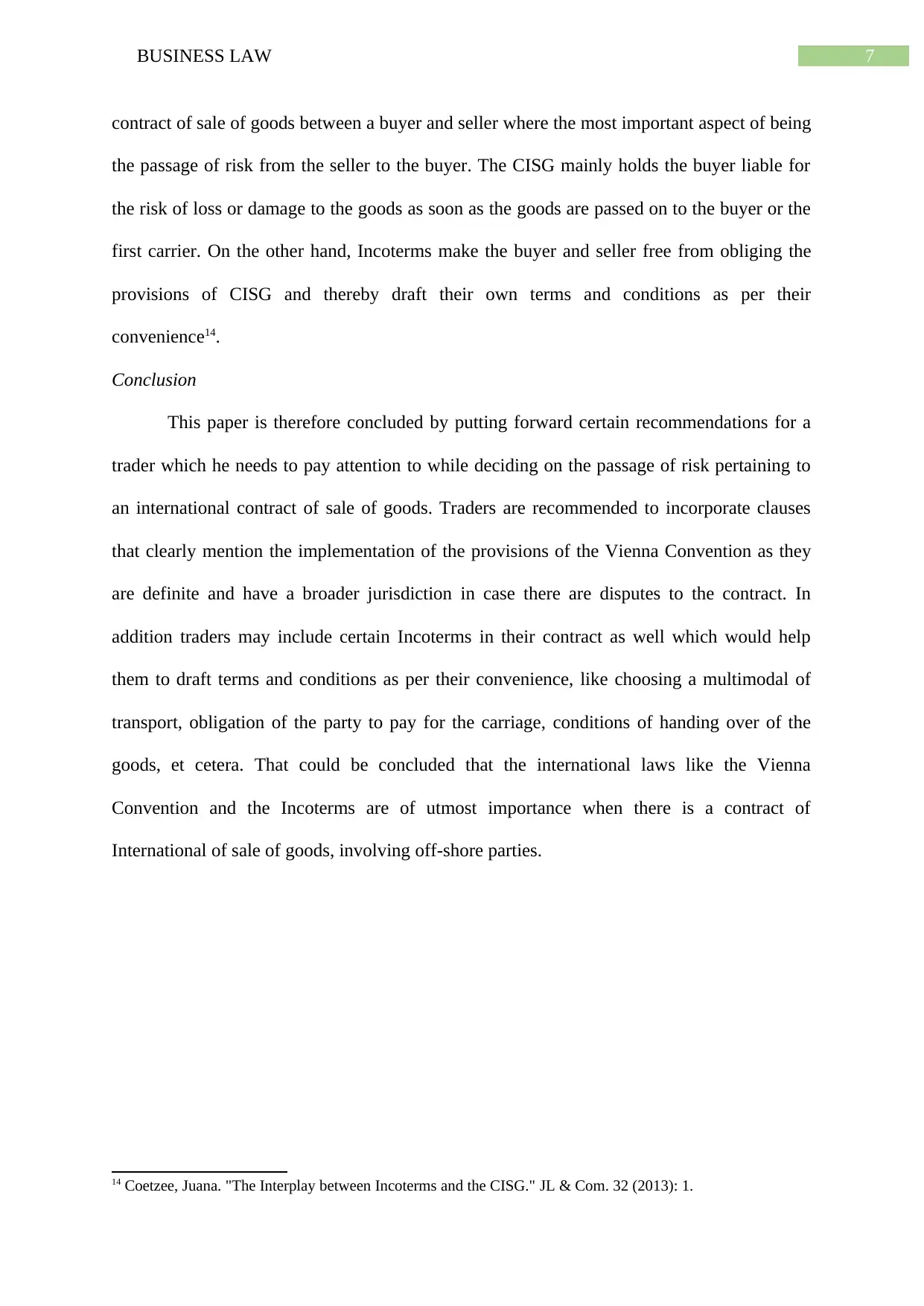
7BUSINESS LAW
contract of sale of goods between a buyer and seller where the most important aspect of being
the passage of risk from the seller to the buyer. The CISG mainly holds the buyer liable for
the risk of loss or damage to the goods as soon as the goods are passed on to the buyer or the
first carrier. On the other hand, Incoterms make the buyer and seller free from obliging the
provisions of CISG and thereby draft their own terms and conditions as per their
convenience14.
Conclusion
This paper is therefore concluded by putting forward certain recommendations for a
trader which he needs to pay attention to while deciding on the passage of risk pertaining to
an international contract of sale of goods. Traders are recommended to incorporate clauses
that clearly mention the implementation of the provisions of the Vienna Convention as they
are definite and have a broader jurisdiction in case there are disputes to the contract. In
addition traders may include certain Incoterms in their contract as well which would help
them to draft terms and conditions as per their convenience, like choosing a multimodal of
transport, obligation of the party to pay for the carriage, conditions of handing over of the
goods, et cetera. That could be concluded that the international laws like the Vienna
Convention and the Incoterms are of utmost importance when there is a contract of
International of sale of goods, involving off-shore parties.
14 Coetzee, Juana. "The Interplay between Incoterms and the CISG." JL & Com. 32 (2013): 1.
contract of sale of goods between a buyer and seller where the most important aspect of being
the passage of risk from the seller to the buyer. The CISG mainly holds the buyer liable for
the risk of loss or damage to the goods as soon as the goods are passed on to the buyer or the
first carrier. On the other hand, Incoterms make the buyer and seller free from obliging the
provisions of CISG and thereby draft their own terms and conditions as per their
convenience14.
Conclusion
This paper is therefore concluded by putting forward certain recommendations for a
trader which he needs to pay attention to while deciding on the passage of risk pertaining to
an international contract of sale of goods. Traders are recommended to incorporate clauses
that clearly mention the implementation of the provisions of the Vienna Convention as they
are definite and have a broader jurisdiction in case there are disputes to the contract. In
addition traders may include certain Incoterms in their contract as well which would help
them to draft terms and conditions as per their convenience, like choosing a multimodal of
transport, obligation of the party to pay for the carriage, conditions of handing over of the
goods, et cetera. That could be concluded that the international laws like the Vienna
Convention and the Incoterms are of utmost importance when there is a contract of
International of sale of goods, involving off-shore parties.
14 Coetzee, Juana. "The Interplay between Incoterms and the CISG." JL & Com. 32 (2013): 1.
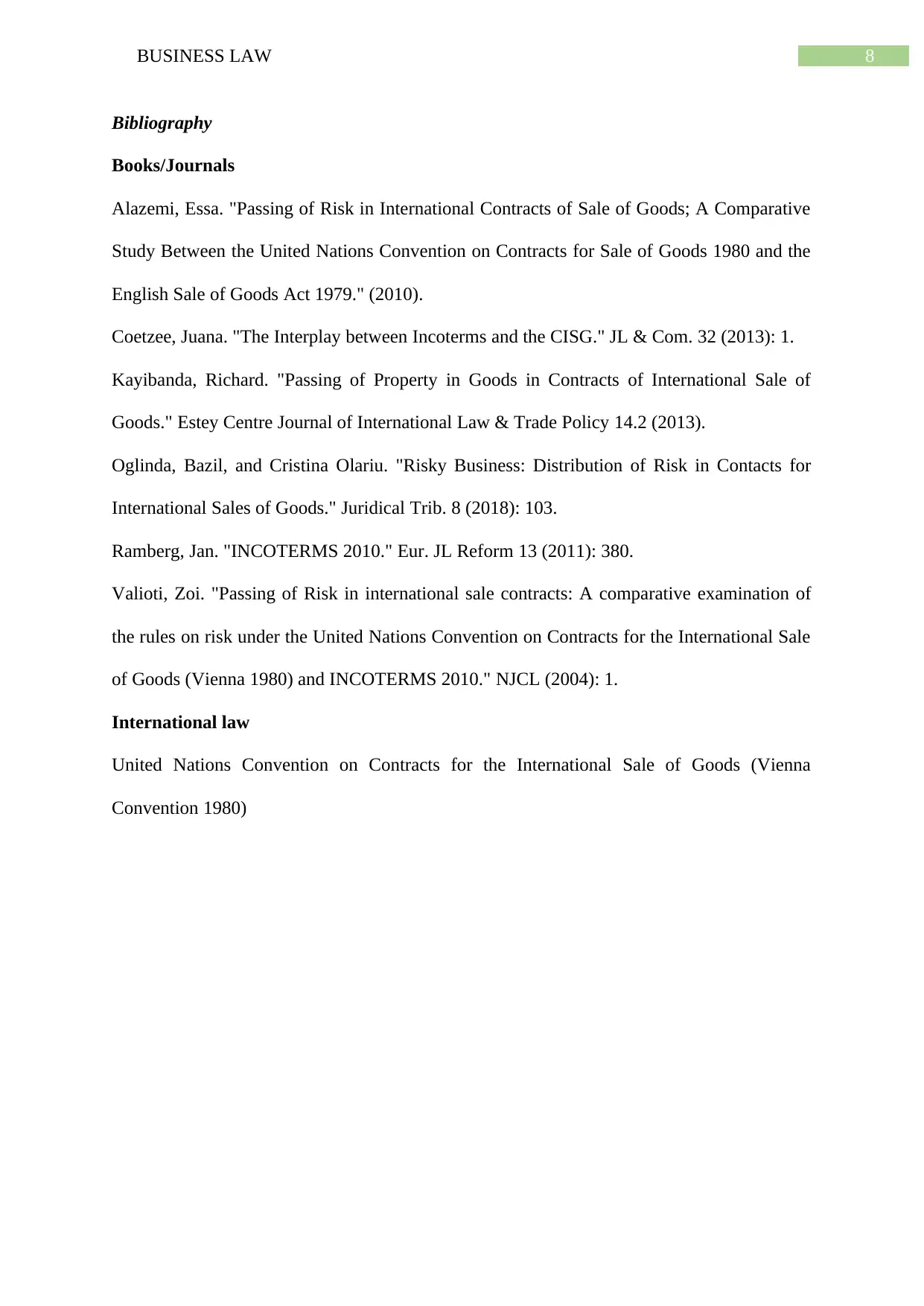
8BUSINESS LAW
Bibliography
Books/Journals
Alazemi, Essa. "Passing of Risk in International Contracts of Sale of Goods; A Comparative
Study Between the United Nations Convention on Contracts for Sale of Goods 1980 and the
English Sale of Goods Act 1979." (2010).
Coetzee, Juana. "The Interplay between Incoterms and the CISG." JL & Com. 32 (2013): 1.
Kayibanda, Richard. "Passing of Property in Goods in Contracts of International Sale of
Goods." Estey Centre Journal of International Law & Trade Policy 14.2 (2013).
Oglinda, Bazil, and Cristina Olariu. "Risky Business: Distribution of Risk in Contacts for
International Sales of Goods." Juridical Trib. 8 (2018): 103.
Ramberg, Jan. "INCOTERMS 2010." Eur. JL Reform 13 (2011): 380.
Valioti, Zoi. "Passing of Risk in international sale contracts: A comparative examination of
the rules on risk under the United Nations Convention on Contracts for the International Sale
of Goods (Vienna 1980) and INCOTERMS 2010." NJCL (2004): 1.
International law
United Nations Convention on Contracts for the International Sale of Goods (Vienna
Convention 1980)
Bibliography
Books/Journals
Alazemi, Essa. "Passing of Risk in International Contracts of Sale of Goods; A Comparative
Study Between the United Nations Convention on Contracts for Sale of Goods 1980 and the
English Sale of Goods Act 1979." (2010).
Coetzee, Juana. "The Interplay between Incoterms and the CISG." JL & Com. 32 (2013): 1.
Kayibanda, Richard. "Passing of Property in Goods in Contracts of International Sale of
Goods." Estey Centre Journal of International Law & Trade Policy 14.2 (2013).
Oglinda, Bazil, and Cristina Olariu. "Risky Business: Distribution of Risk in Contacts for
International Sales of Goods." Juridical Trib. 8 (2018): 103.
Ramberg, Jan. "INCOTERMS 2010." Eur. JL Reform 13 (2011): 380.
Valioti, Zoi. "Passing of Risk in international sale contracts: A comparative examination of
the rules on risk under the United Nations Convention on Contracts for the International Sale
of Goods (Vienna 1980) and INCOTERMS 2010." NJCL (2004): 1.
International law
United Nations Convention on Contracts for the International Sale of Goods (Vienna
Convention 1980)
⊘ This is a preview!⊘
Do you want full access?
Subscribe today to unlock all pages.

Trusted by 1+ million students worldwide
1 out of 9
Related Documents
Your All-in-One AI-Powered Toolkit for Academic Success.
+13062052269
info@desklib.com
Available 24*7 on WhatsApp / Email
![[object Object]](/_next/static/media/star-bottom.7253800d.svg)
Unlock your academic potential
Copyright © 2020–2026 A2Z Services. All Rights Reserved. Developed and managed by ZUCOL.





